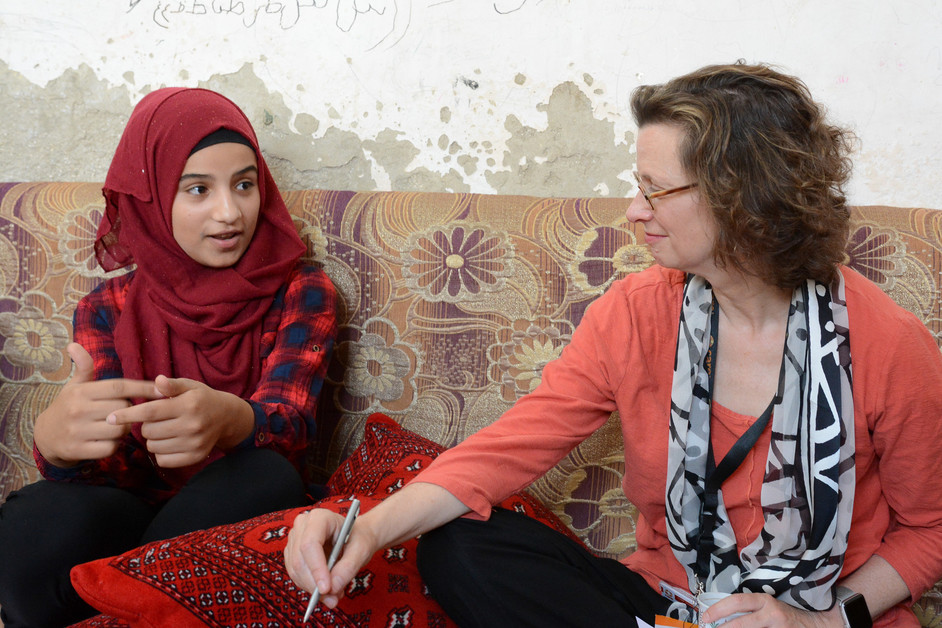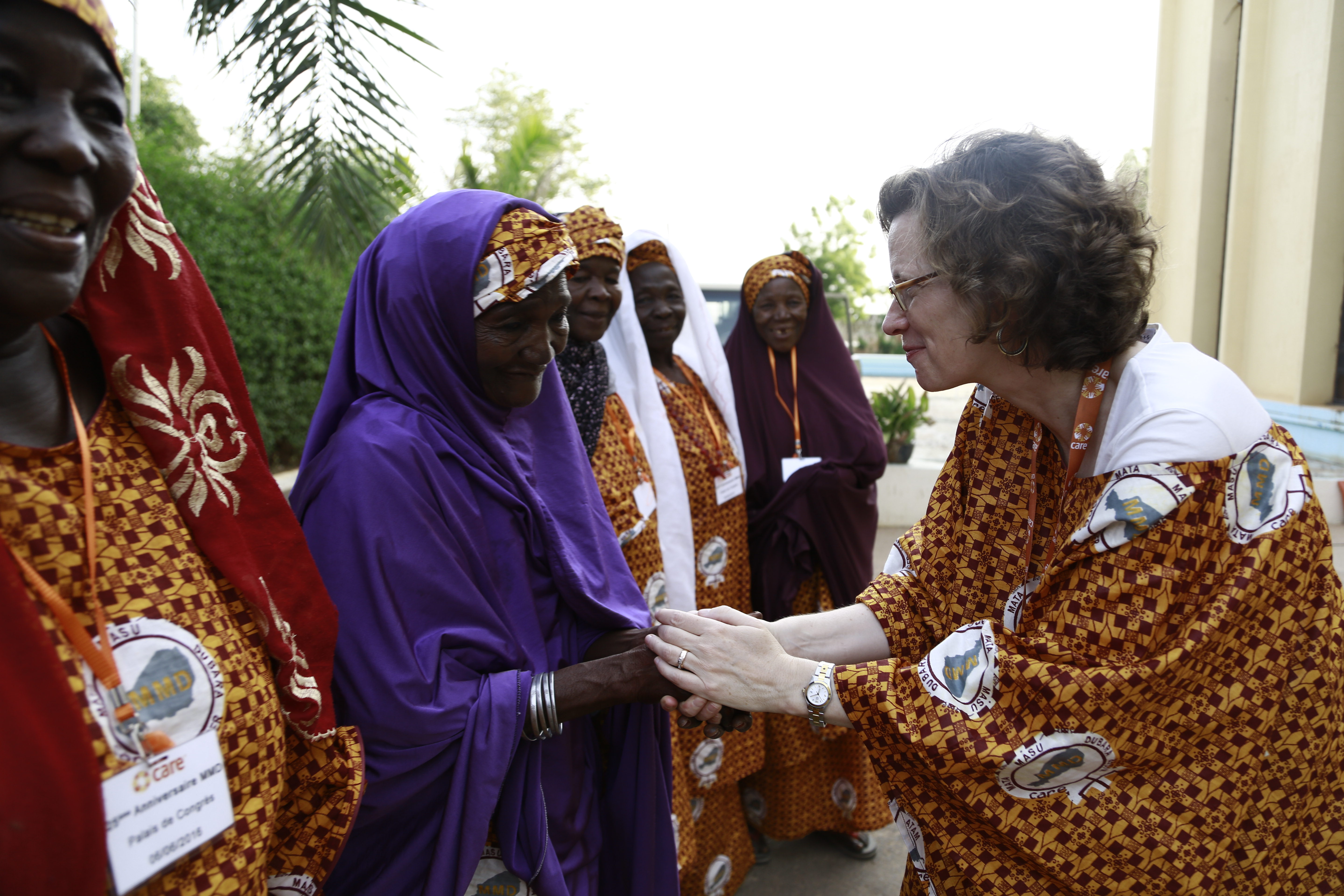Women Leading the Way: Q&A with CARE CEO Michelle Nunn

World Food Programme (WFP) believes women are the key to ending hunger. To do this, we need to not only empower the women we serve, but also empower the women we work with to lead – at WFP and humanitarian organizations worldwide.
This spring, we’re highlighting the incredible work of female leaders in the humanitarian sector. We recently had the opportunity to sit down with Michelle Nunn, CEO of WFP partner CARE – an organization dedicated to ending global poverty. We asked Michelle about her experience as a leader in the sector and why she believes that empowering women is the key to ending hunger and poverty.
WFP USA: You have spent a majority of your career in nonprofit/public service. What motivated you to go into a career focused on social good?
MN: I have always found meaning and joy in service. It started with volunteering when I was young. In high school and through college, I volunteered as a mentor, with seniors, and with a shelter for kids. It became clear early on that service is where I discovered purpose. The example of my parents and their deep commitment to public service also shaped my interest. I really never considered doing anything else.
WFP USA: As a female leader in the sector, what have been some of the most important lessons you’ve learned in your career to date?
MN: I have learned many lessons that include the importance of perseverance, risk-taking, and trying to be bold in setting goals. (And I am still learning and re-learning these lessons.) I have learned that valuing and promoting women in leadership is critical to any organization (or nation’s) success. We know that we can’t realize the Sustainable Development Goals (SDG) without equality for women and we know that women’s voices are critical to the solutions to end hunger and poverty. In humanitarian response and peace-keeping, for example, women must be included in the decisions about what kinds of help, protection and overall interventions are needed. It’s imperative that we lead in these discussions and share our unique vantage point.
WFP USA: CARE, along with WFP, believes strongly in empowering women and girls to end hunger and poverty. Why do you feel that women and girls are the solution to these problems?
MN: It’s simple and clear. Armed with the opportunity to learn, earn and lead, we know women and girls can lift their families and their communities out of poverty. Take hunger. The number of people suffering from hunger has been on the rise since 2014 and is now estimated at 821 million, with more than 150 million children suffering permanent damage from lack of nutrition. That’s the challenge. Still, we have an unprecedented opportunity to use technology, expertise and collaboration across sectors to create a more sustainable, equitable food system globally. And we know women farmers are the key. If women farmers had the same access to productive resources as men, they could increase yields on their farms by 20-30 percent – and potentially reduce the number of hungry people in the world by 100-150 million.

*Michelle Nunn during a visit to the West African country of Niger.
WFP USA: What other humanitarian causes do you feel most passionate about right now and why? Have your passions evolved over the course of your career?
MN: I would highlight the world refugee crisis. There are more displaced people on our planet today – 68.5 million – than at any time in recorded history. And the global refugee crisis is growing, driven by conflict, drought, and famine, all exacerbated by climate change.
I think my passions have grown increasingly global, particularly as my work at CARE underscores how interconnected the world really is. But one thing has remained constant: the need for everyone to get involved. There are enough challenges and causes around the world for everyone to pitch in and find a way to be a part of the “change they want to see in the world.”
WFP USA: How have you seen the humanitarian/social good sector evolve over your career? What current trends are you seeing disrupt the sector?
MN: There have been enormous changes over the course of my career – the evolution towards localization and community-owned change, an increasingly diverse sector workforce, an emphasis on inclusive governance and sustainable change, just to name a few. The sector has been transformed by technology and communication, with even more promise and opportunity. And there is a recognition in the sector that long-term change will necessitate multi-sector solutions. I am excited that social ventures and market-based approaches have the opportunity to continue to drive scale and change. And we also have some challenges that include increasing security threats to our humanitarian workers, the closing space for civil society, and increasing distrust of institutions including nonprofit organizations.
WFP USA: When it comes to ending poverty, what are the biggest challenges we’re facing right now?
MN: I think our biggest challenge will be maintaining the momentum we’ve gained in the war against poverty and injustice around the world. While extreme poverty has declined by nearly half in the last two decades, the number of people around the world who are not getting enough to eat is up for the third year in a row after many years of progress. We must fight against climate change, complacency, and quite simply for mind share. There are so many competing priorities that it will be critical to break through to keep people aware of the world’s challenges and more importantly provide hope by pointing out some key solutions and highlighting our progress.
WFP USA: How do you think these challenges could be addressed?
MN: At CARE, we believe that we will not realize the first SDG goal of ending poverty, without the 5th goal of achieving gender equality. We must build the coalitions, change movements and systemic policy change to lift up women and girls. And we must recognize the interconnected and holistic approaches required to create change. We must also remind people that progress is possible and real. We need to ensure that we change the narrative to tell powerful stories of possibility and hope.
We’re doing this at CARE with the launch of CARE News, a new content strategy to tell our stories in a more impactful way. We’re relying on local storytellers (either CARE staff or writers based in the countries where we work) that tell human-centered, visual stories. In these stories, CARE is not the hero. Real people in the communities where we work are. The content highlights the often-overlooked stories of women and girls, explores humanitarian work, and report on global poverty and the progress against it. We need to build the constituency for our shared work around the world.
WFP USA: With the current state of humanitarian relief in mind, what advice would you give women looking to become leaders in humanitarian relief? What are characteristics they should develop and/or topics in which they should gain expertise?
MN: I would advise to embrace your own power – don’t underestimate your own capacity to take on increasing leadership. Gain expertise by working internationally and developing specific expertise, but also prepare yourself with overall management, fundraising, or business expertise so that you ready yourself for overall organizational leadership. Follow your passions and seek out mentors and peers for support, advice, and wisdom! And take care of yourself and ensure you are sustaining the stamina for running the long race.




